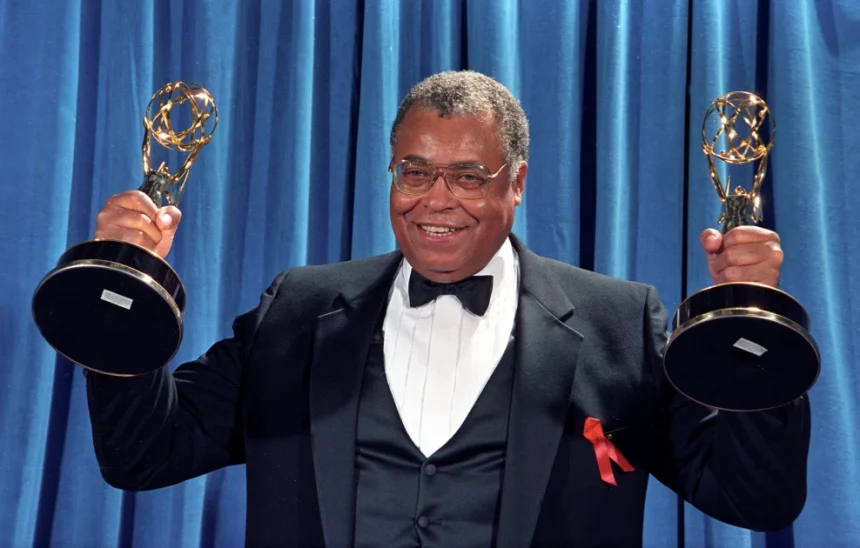James Earl Jones, the iconic stage and screen actor known for overcoming a childhood stutter to develop a commanding voice recognized worldwide as that of Darth Vader, passed away on Monday at the age of 93. His agent, Barry McPherson, confirmed that Jones, who had long battled diabetes, died peacefully at home surrounded by his family. The cause of death was not disclosed.
Jones, renowned for his physical presence on stage, television, and in film, would have been a star even if his face had never appeared on screen. His deep, resonant voice became a character of its own, whether commanding respect as Mufasa in “The Lion King” or instilling fear as Darth Vader in the “Star Wars” series.
When asked by a BBC interviewer if he ever felt restricted by his association with Darth Vader, Jones chuckled.
“I love being part of that whole myth, of that whole cult,” he remarked, happily obliging fans who asked him to recite Vader’s famous line to Luke Skywalker, played by Mark Hamill: “I am your father.” On Monday, Hamill took to X to honor him, writing, “#RIP dad” with a broken heart emoji.
Despite the iconic role, Jones shared that he didn’t earn much from his portrayal of Darth Vader, receiving only $9,000 for the first film. He considered it a mere special effects job and even opted out of being credited in the first two “Star Wars” movies.
Throughout his career, Jones amassed numerous accolades, including Tony Awards for “The Great White Hope” in 1969 and “Fences” in 1987, and Emmys in 1991 for “Gabriel’s Fire” and “Heat Wave.” He also won a Grammy in 1977 for best spoken word album, “Great American Documents.”
While he never won a competitive Academy Award, he was nominated for best actor for the film adaptation of “The Great White Hope” and received an honorary Oscar in 2011.
Jones made his film debut as Lieutenant Luther Zogg in Stanley Kubrick’s 1964 masterpiece “Dr. Strangelove or: How I Learned to Stop Worrying and Love the Bomb.”
James Earl Jones: Celebrated Actor of Stage and Screen Dies at 93
James Earl Jones continued to shine in notable roles throughout his career, including portraying novelist Terence Mann in 1989’s *Field of Dreams* and Reverend Stephen Kumalo in 1995’s *Cry, the Beloved Country*. His filmography also includes *Conan the Barbarian*, *Coming to America*, *The Sandlot*, *Matewan*, *The Hunt for Red October*, and *Field of Dreams*, among others.
In addition to his film work, Jones lent his powerful voice to countless television commercials. For years, CNN used his iconic, authoritative “This is CNN” to introduce their newscasts.
Estranged From Father
Born on January 17, 1931, in the small community of Arkabutla, Mississippi, James Earl Jones came from a mixed ethnic heritage of Irish, African, and Cherokee. His father, Robert Earl Jones, a former prizefighter-turned-actor, left the family shortly after James was born.
Raised by his maternal grandparents, who forbade him from seeing his father, Jones did not reconnect with him until the 1950s when he moved to New York. Eventually, father and son appeared in several plays together.
At around the age of five, Jones and his grandparents moved from Mississippi to a farm in Michigan. It was during this time that his struggle with a stutter led him to stop speaking altogether. For nearly a decade, he remained mostly silent until a high school English teacher devised a plan to help him find his voice.
The teacher assigned Jones to recite a poem in class, claiming he had written it. The challenge forced Jones to prove his familiarity with the work by reading it aloud.
Although he continued to choose his words carefully, this exercise helped Jones control his stutter and sparked his interest in acting. After studying drama at the University of Michigan, he moved to New York, where his theater performances began to gain critical acclaim.
His breakthrough on Broadway came with *The Great White Hope*, where he portrayed a character inspired by Black heavyweight champion Jack Johnson. The play tackled issues of racism through the lens of boxing, and critics were effusive in their praise of Jones’ powerful performance.
Jones remained a popular presence in theater for decades, taking on Shakespearean roles such as Hamlet, Macbeth, King Lear, and Othello. In 1977, he received recognition for his portrayal of singer-actor-activist Paul Robeson on Broadway, and he played author Alex Haley in the television miniseries *Roots: The Next Generation*.
He was “capable of moving in seconds from boyish ingenuousness to near-biblical rage and somehow suggesting all the gradations in between,” the Washington Post wrote in a 1987 review of “Fences.”
Jones’ first wife was Julienne Marie Hendricks, one of his “Othello” co-stars.
Earl and his second wife, actress Cecilia Hart, who died in 2016, had one child, Flynn Earl Jones.
Jones was a trailblazing Black actor, winning big roles in racially charged movies and plays that broke ground for Black actors that came after him.
But Jones, who first found fame at the height of the Civil Rights movement in the 1960s and 1970s, largely kept himself out of direct action on matters of race.
In a 2013 interview with the Toronto Star, Jones said he imagined that a lot of people felt he was cowardly at the time for not using his fame and voice to more robustly support the cause. But the actor said he preferred to let his work do the talking for him.
“Don’t get me wrong. I believe in the same things that all those people demonstrating believe in, but I just look for plays or movies that say the same thing and play characters in them,” Jones told the Star.
Dominic Hawkins, a spokesperson for the NAACP in Washington, said Jones’ winning of big roles even as the Jim Crow racial caste system still plagued the American South was hugely important for the Black community.
“That was his contribution to civil rights, his representation on screen and stage,” Hawkins said. “Film and TV has the power to shape hearts and minds, and that’s what he did.”



